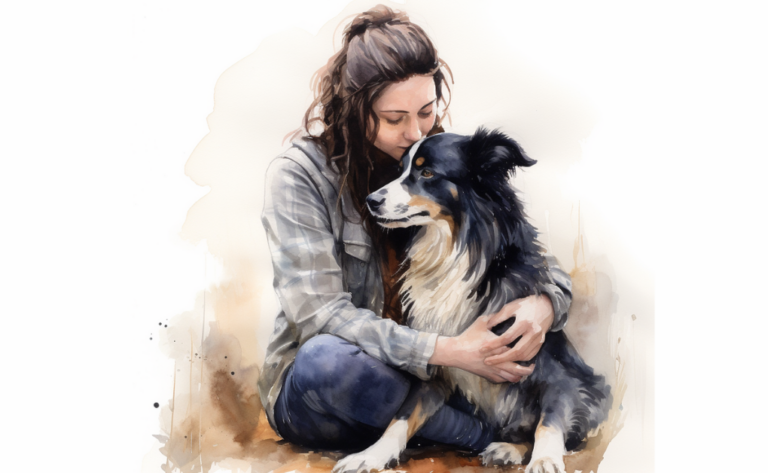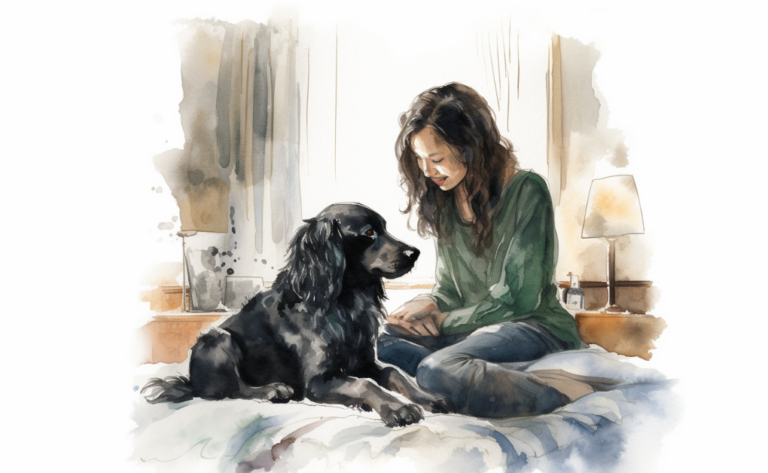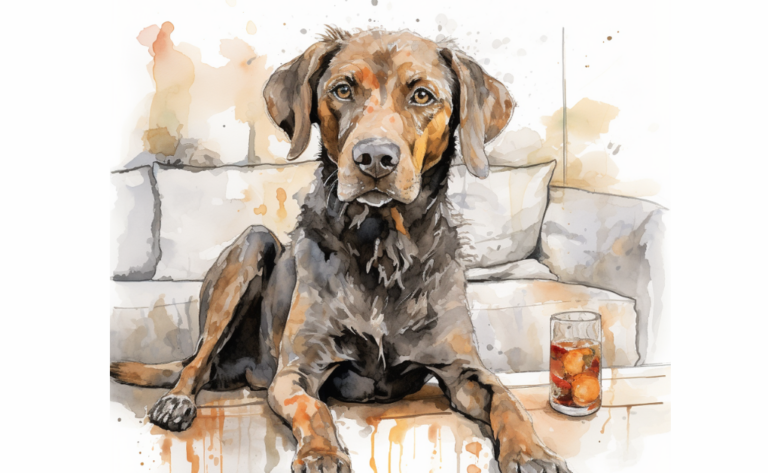What is Diarrhea in Dogs?
What is it?
How is it Treated?
Breed Predispositions
German Shepherds Labrador Retrievers Beagles Golden Retrievers Boxers Cavalier King Charles Spaniels Maltese Yorkshire Terriers Chihuahuas Miniature Schnauzers
Introduction
It had been a long day at work, and all Mike wanted was to relax at home with his faithful Beagle, Buster. However, as soon as he opened the door, he was greeted by an unmistakable and unpleasant odor. He quickly discovered that Buster had been suffering from diarrhea, leaving a mess throughout the house. Concerned for his furry friend’s health and comfort, Mike knew it was time to consult the veterinarian for advice.
Diarrhoea, or diarrhea in dogs, is characterized by bowel movement volume, frequency, or consistency alterations. It typically manifests as loose, watery, or excessively frequent stools. Diarrhea is a prevalent issue in canines and can be a source of distress for both the pet and the owner. However, it’s important to note that it usually indicates an underlying health problem rather than a disease and can often be a sign of mild intestinal distress.
Diarrhea can present in two distinct regions of the digestive system, either the small or large intestine, with the characteristics of the diarrhoea varying based on its origin. Approximately 60 to 80 percent of your pet’s immune system resides within the digestive tract. Diarrhoea that originates in the small intestine often produces large volumes of very watery stool, whereas diarrhoea from the large intestine typically results in smaller quantities of stool. The latter can sometimes be encased in mucus or blood and may cause the dog to exhibit straining to pass a stool.
The Canine Digestive System
Many factors affect how quickly or slowly food travels through a dog’s digestive system. These include the size of the meal, the length of time it takes to digest the food, the type of food consumed, and whether the dog chews his food well. In addition, keeping it healthy is essential.
The canine digestive system is a complex series of organs and enzymes designed to break down food, absorb nutrients, and expel waste products. Here’s a step-by-step guide to understanding how it works:
- Mouth and Teeth: Digestion begins in the mouth, where the dog’s teeth tear, grind and break down food. Saliva also plays a role in moistening the food and starting the process of breaking down carbohydrates.
- Esophagus: The esophagus is the tube that carries food from the mouth to the stomach. When a dog swallows, the esophagus contracts, moving the food into the stomach.
- Stomach: The stomach is where the majority of digestion occurs. The stomach lining produces acids and enzymes that break down the food. The stomach also churns food into a liquid mixture, preparing it for further digestion in the small intestine.
- Small Intestine: The small intestine is where the bulk of nutrient absorption occurs. Digestive enzymes from the pancreas and bile from the liver continue the breakdown of proteins, carbohydrates, and fats. The lining of the small intestine absorbs these nutrients into the bloodstream.
- Pancreas: The pancreas secretes digestive enzymes into the small intestine, assisting in the breakdown of food. It also produces insulin, which helps regulate blood sugar levels.
- Liver: The liver produces bile, which aids in the digestion and absorption of fats. It also plays a role in detoxifying the body and storing nutrients.
- Large Intestine (Colon): The large intestine absorbs water and electrolytes from the remaining indigestible food matter. It also transports feces toward the rectum for elimination.
- Rectum and Anus: The rectum is the final section of the digestive tract. It stores feces until they are expelled through the anus.
Every part of the canine digestive system plays a crucial role in maintaining a dog’s health. Any disruptions to this system, such as disease, infection, or blockage, can cause significant health problems, including diarrhea, vomiting, weight loss, and more. Therefore, providing your dog with a balanced diet and regular veterinary care is important to maintain its digestive system properly.
Types of Dog Diarrhea
Dog diarrhea can be categorized into two primary types: acute and chronic. Each type has its distinct characteristics and potential causes:
Acute Diarrhea
This type of diarrhea occurs suddenly and lasts a relatively short time, typically one to two days. It can be caused by various factors, including dietary indiscretions (eating something they shouldn’t have), stress, changes in diet, or bacterial, viral, or parasitic infection. The stool consistency is generally loose or watery, and the dog may exhibit signs of discomfort or urgency when defecating.
Chronic Diarrhea
Chronic diarrhea is a long-term condition that lasts for several weeks or longer. It can be intermittent or continuous. This type of diarrhea can indicate a more serious underlying health issue, such as inflammatory bowel disease, certain types of cancer, food allergies or intolerances, or chronic parasitic infections. The stool may vary in consistency, from soft to watery, and may contain blood, mucus, or fat.
Each type of diarrhea may also be characterized by its location within the digestive tract, either as small bowel (originating in the small intestine) or large bowel (originating in the large intestine or colon) diarrhea. Small bowel diarrhea often results in large volume but less frequent bowel movements. In contrast, large bowel diarrhea typically results in smaller volume but more frequent bowel movements, often with mucus or blood present.
In any case of diarrhea, particularly if it persists beyond a couple of days, is accompanied by other signs of illness (such as vomiting, loss of appetite, or lethargy), or if the dog is very young, old, or has an existing health condition, it’s important to consult a veterinarian.
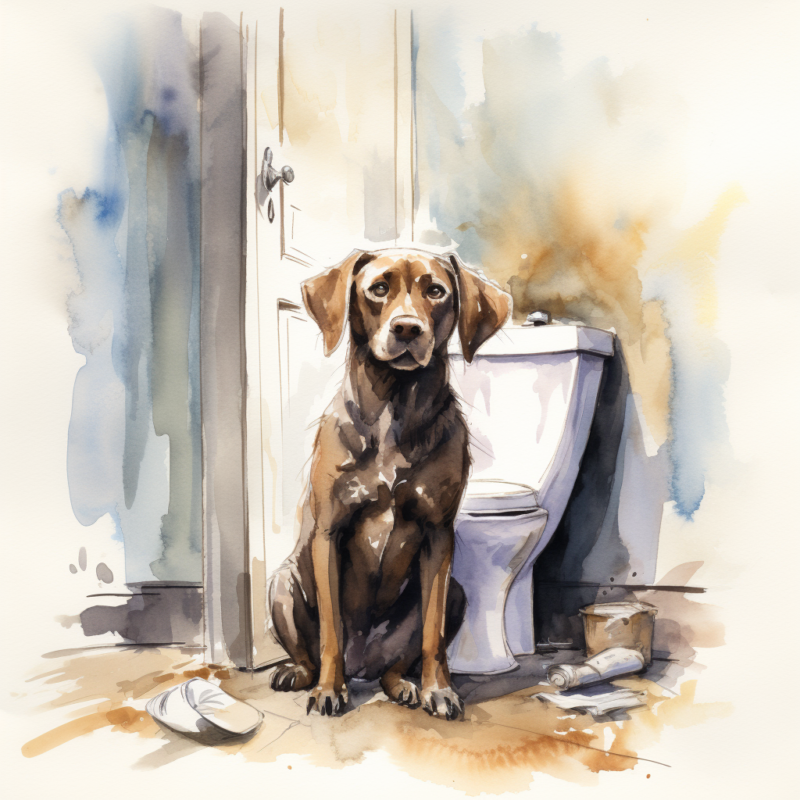
What Causes Dog Diarrhea?
Dogs can develop diarrhea from various sources, broadly grouped into dietary triggers, infections, medical conditions, and other miscellaneous causes. Here are some common causes of diarrhea in dogs:
Dietary Factors: A sudden shift in a dog’s diet, feeding them unfamiliar food, or a dietary indiscretion, such as the consumption of
- garbage
- spoiled food, non-food items
These can upset their digestive system and lead to intestinal distress, causing diarrhea. Some dogs might also be affected by food allergies or intolerance, including an adverse reaction to certain types of food, such as cottage cheese, which can provoke diarrhea.
Infectious Agents: Diarrhea in dogs can result from multiple types of infections. These include:
- bacterial infections
- viral infections (such as parvovirus or coronavirus)
- parasitic infections (like giardia, roundworms, hookworms, or whipworms)
which are some common causes of dog diarrhea.
Medical Conditions: Certain diseases or medical conditions can also cause diarrhea in dogs, including:
- inflammatory bowel disease
- pancreatitis
- liver or kidney disease
- cancer
- stress or anxiety
Other Triggers: Ingesting human medication or exposure to toxins can trigger diarrhea. Some dogs may also experience diarrhea due to a blockage or other issues in the digestive tract. There are instances where the cause of the diarrhea may be idiopathic, meaning the precise reason remains unknown.
Contact your vet immediately should your pet display any symptoms of diarrhea. Prompt veterinary attention can help determine the cause and appropriate treatment for your dog’s condition. Lastly, intestinal parasites and viral infections are important causes of diarrhea that must be considered.
Signs of Diarrhea in Dogs
Dogs suffering from diarrhea often display various signs depending on the health issue’s root cause, duration, and severity. The most evident symptom is the frequent passing of loose or watery stools, often noticed during an episode of diarrhea. However, diarrhea in dogs can be accompanied by other signs:
- Augmented stool volume or the dog’s stool is greater in amount.
- Increased frequency of defecation.
- An urgent need to defecate.
- Unexpected accidents inside the house.
- Detection of blood or mucus in the stool, potentially indicating bloody stool or a more serious issue.
- Vomiting, which can accompany chronic diarrhea in dogs.
- A state of lethargy or fatigue.
- Loss of appetite.
- Unexplained weight loss.
- Dehydration, often secondary to passing small amounts of watery stool frequently.
- Abdominal discomfort or pain.
If your dog exhibits any of these symptoms, especially if they persist for more than 24 hours or if there are two or more bouts of two runny or soft stools in a short period, it’s crucial to contact your vet immediately. Timely veterinary intervention can determine the cause and prescribe a suitable treatment.
Diagnosis of Canine Diarrhea and When Should You Take Your Dog to the Vet?
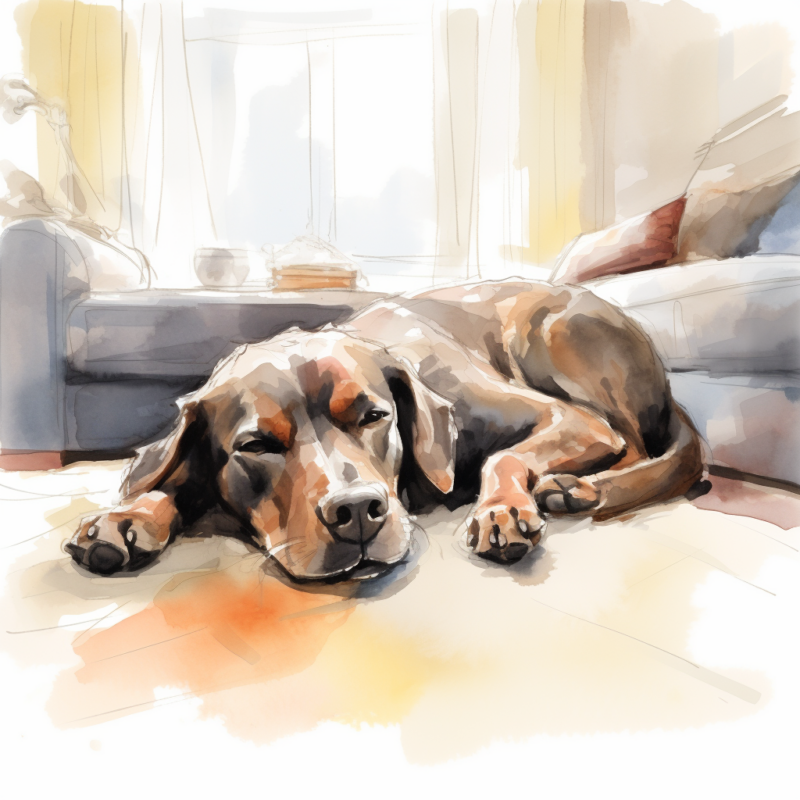
Diagnosing diarrhea in dogs usually involves a few steps, beginning with an extensive history and physical examination, followed by specific diagnostic tests. These could encompass:
Detailed History and Physical Examination
The vet initiates the diagnosis process by enquiring about your dog’s symptoms, diet, surroundings, and potential exposure to toxins or parasites. They’ll also conduct a comprehensive physical examination to inspect for signs of illness in your dog’s poop and overall health.
Examination of Fecal Matter
A fecal examination is generally the inaugural diagnostic test performed when a dog has recurring bouts of diarrhea. This examination can uncover the existence of parasites like worms and Giardia, intestinal bacteria, viruses, or irregularities in digestive operations.
Blood Analysis
Blood tests such as a complete blood count (CBC) and a serum biochemistry profile can provide insights into your dog’s overall well-being. They may disclose indicators of infections, inflammation, anemia, and other health issues that could be causing diarrhea cases.
Urinalysis
A urine test could assist in eliminating certain systemic conditions that could lead to diarrhea, like kidney disease.
Radiographs or Ultrasound
If the vet suspects a blockage or another internal issue, they might propose radiographs (X-rays) or an ultrasound. These imaging studies can exhibit issues like obstructions, tumors, or abnormalities in the digestive organs.
Endoscopy or Colonoscopy
Sometimes, the vet might recommend an endoscopy or colonoscopy, especially if the diarrhea is chronic or other tests don’t deliver a clear diagnosis. These procedures involve inserting a small camera into the digestive tract to directly observe the lining of the stomach and intestines and obtain biopsy samples if necessary.
Tests Tailored for Suspected Conditions
If the vet suspects a specific condition, they might suggest additional tests. For instance, if they suspect pancreatitis, they might recommend a test for pancreatic enzymes. They might also propose a food trial or specific allergy testing if they suspect a food allergy.
Remember that diagnosing the cause of diarrhea in dogs can sometimes be intricate and necessitate multiple tests. If symptoms persist, don’t hesitate to visit the nearest emergency animal hospital. Always communicate openly with your vet about your dog’s symptoms and any changes in their condition. It’s imperative to work closely with your vet, who will let you know whether you need to bring your pet in immediately.
Treatment for Diarrhea in Dogs
Addressing diarrhea in dogs hinges on its cause, intensity, and duration. Here’s what your vet may advise:
- Diet Modifications: Dietary management can benefit many instances of acute diarrhea. Your vet may recommend a short-term shift to a bland, easily digestible diet. This could encompass foods like boiled chicken and rice or a prescribed diet devised for gastrointestinal health. You can then gradually reintroduce their regular food over time.
- Fasting: A period of fasting (12-24 hours) may be suggested for adult dogs to allow the gut to rest and recuperate. This should only be pursued under the guidance of a veterinarian, as puppies and certain health conditions may not withstand fasting.
- Hydration Therapy: If your dog has become dehydrated due to intense or extended diarrhea, it may necessitate hydration therapy. This could be administered subcutaneously (beneath the skin) or intravenously, contingent on the dehydration’s severity.
- Probiotics: These are beneficial bacteria that aid in reinstating the normal balance of the gut flora. Probiotics are frequently used in conjunction with other treatments to manage diarrhea.
- Medications: Various medications might be employed depending on the cause of diarrhea. These could encompass antibiotics for bacterial infections, dewormers for parasitic infections, or specific drugs to curtail inflammation in the case of certain illnesses like inflammatory bowel disease.
- Parasite Management: Specific deworming medications will be required if parasites trigger diarrhea.
- Addressing Underlying Conditions: If the diarrhea is a symptom of a broader health concern, such as kidney disease, pancreatitis, or a food allergy, treating the underlying condition is crucial to resolving diarrhea.
Always contact your veterinarian if your dog is enduring diarrhea, especially if it’s extended, severe, or accompanied by other symptoms (like vomiting or loss of appetite). This is particularly important for very young, old dogs or those with pre-existing health conditions who may require emergency care.
Resolving the Underlying Cause
Often, treating the underlying cause of diarrhea proves to be the most effective way to handle it. For example, a dietary change might be necessary if a food allergy triggers diarrhea. If an underlying disease like pancreatitis or liver disease is the cause, then a specific treatment for that condition will be essential.
Remember, some over-the-counter remedies might help with mild diarrhea, but they could sometimes cause more harm than good, especially if improperly used or for the wrong type of diarrhea. Thus, it’s always best to consult with a vet before administering any medication for diarrhea. Likewise, never give your dog medications formulated for people. However, if your pet has had a bout of diarrhea, a small amount of attention can make a big difference. Your vet will identify the cause of your pup’s diarrhea and recommend the most effective treatment, particularly important for dogs with chronic diarrhea.
Home Remedies for Dog Diarrhea
When your dog is showing signs of diarrhea, it’s vital to contact your vet right away as diarrhea is one symptom that could indicate many conditions, some quite serious. However, after serious causes have been ruled out, there are some home treatments you can employ to help manage mild cases of diarrhea:
- Fasting: Allowing your dog to have a short fasting period (12-24 hours, but no more) can give their gastrointestinal tract time to recover. During this period, ensure your dog has access to plenty of fresh water to prevent dehydration.
- Bland Diet: After a fast, you may want to give your dog time to recover by feeding them a bland diet, which can help gently bring their digestive system back to regular function. This diet typically includes boiled white rice and chicken or turkey (without skin or seasoning). Gradually, over several days, reintroduce their regular diet, which could be specially formulated dog foods.
- Pumpkin: Unflavored, canned pumpkin (not the pumpkin pie filling) is a good source of fiber and can help solidify your dog’s stool. Incorporate a spoonful into your dog’s meal.
- Probiotics: Supplementing your dog’s diet with dog-specific probiotics can aid in restoring the equilibrium of beneficial bacteria in their gut, assisting digestion and reducing instances of diarrhea.
- Hydration: Keeping your dog hydrated is crucial, as diarrhea, especially small amounts of watery diarrhea, can quickly lead to dehydration. Always make fresh water available. In extreme cases, an electrolyte solution may be necessary.
Dog owners should remember that these remedies are only for managing mild, short-term diarrhea and aren’t substitutes for professional veterinary care. However, if your dog is experiencing repeated episodes of diarrhea, or if the diarrhea is otherwise accompanied by other symptoms such as vomiting, lethargy, or loss of appetite, or if you suspect your dog has eaten something they shouldn’t have, your vet will let you know if a vet should see them.
Prevention of Diarrhea in Dogs
Avoiding diarrhea in dogs largely requires maintaining proper hygiene and dietary habits. Here are some pet care tips that can help prevent episodes of dog diarrhea:
- Consistent Vet Visits: Regular veterinary check-ups can help catch potential issues early, ensure your dog is healthy, and keep your pet’s vaccinations up-to-date.
- Stable, Nutritious Diet: Provide your dog with a steady, balanced diet. Rapid changes in diet can lead to dietary indiscretion, causing a digestive disturbance, so any alterations to their food should be implemented gradually.
- Avoid Human Food: Numerous foods safe for humans can cause stomach upset or be toxic to dogs. Never give your dog scraps from the table, and keep foods like chocolate, grapes, raisins, and xylitol-sweetened foods away from them.
- Cleanliness: Frequently clean your dog’s bedding, toys, food and water bowls to reduce exposure to detrimental bacteria.
- Access to Clean Water: Always ensure your dog has access to clean water to stave off dehydration, which can lead to diarrhea.
- Manage Parasites: Administer parasite control products regularly to prevent infestations of worms and other parasites that can cause diarrhea.
- Steer Clear of Contaminated Areas: Prevent your dog from accessing areas known to be contaminated with feces, particularly in public parks or other communal areas where dogs gather.
- Supervise During Walks: While on walks, monitor your dog to prevent them from eating things off the ground like trash, plants, or feces, which could provoke gastrointestinal upset.
- Manage Stress: Sudden alterations in the environment or routine can result in stress-induced diarrhea in dogs. Aim to keep changes to a minimum, and when unavoidable, introduce them gradually.
If your dog experiences mild bouts of diarrhea, it may recover by fasting for 12 hours or eating a small amount, allowing time to recover by simply resting its digestive system.
Remember, while these steps can aid in preventing many cases of acute diarrhea, they cannot thwart them all, including diarrhea in dogs and cats. Therefore, if your dog develops diarrhea, it’s crucial to consult a veterinarian for a proper diagnosis and treatment.
Frequently Asked Questions
Disclaimer: The information provided on this veterinary website is intended for general educational purposes only and should not be considered as a substitute for professional veterinary advice, diagnosis, or treatment. Always consult a licensed veterinarian for any concerns or questions regarding the health and well-being of your pet. This website does not claim to cover every possible situation or provide exhaustive knowledge on the subjects presented. The owners and contributors of this website are not responsible for any harm or loss that may result from the use or misuse of the information provided herein.





